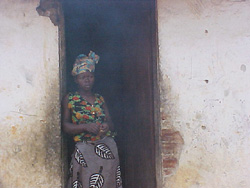ANGOLA: Women, War and Reconciliation
UAMBA, 27 February 2003 (IRIN) - "I came here to the quartering area to try and find my husband, the father of my children," Celita Vasco says. "But when I arrived here I heard that my husband had died in the war. My children have no father." She indicates the baby on her lap: "The father of this child here, also went away. He is in Uige - he left me, I thought he was gone, so I came here." Her story is typical of women who found themselves caught up amid the ever-changing front lines of the Angolan civil war. The husband she spoke of was a UNITA soldier in the town of Negage, who left to join the guerrilla war when the Angolan Armed Forces (FAA) drove UNITA out of Negage in 1997. "The husband I had, when he went to the bush, I stayed because with the children I couldn't go to the bush. A man from the FAA kept me." It was the FAA officer who fath ered Vasco's youngest child, and his departure prompted her to start looking for her first husband. She knew that UNITA soldiers who had been active in the area would have assembled at the gathering area of Uamba, 150-km east of Negage.
ered Vasco's youngest child, and his departure prompted her to start looking for her first husband. She knew that UNITA soldiers who had been active in the area would have assembled at the gathering area of Uamba, 150-km east of Negage.
Having received the news of his death in battle, she is still waiting at Uamba, living in the house of an uncle who had also been in the bush with UNITA. She hopes to return to her family home in Huambo, central Angola, if and when the government's long-delayed social reintegration programme gets under way. Adriana Faustino, also from Negage, tells a similar story: "My husband went to the bush. The police raped me, and as a result of this I became pregnant. I left there because I was abandoned, and came here to look for my husband. Faustino, at least, was reunited with her husband in the gathering area. "I found my first husband here. The man who raped me, I don't know where he is, he abandoned me." Some of the women describe their relationship with FAA or police officers as one of rape, others of forced marriage. Mary Daly, an Irish doctor who has spent more than 20 years in Angola, speaks of the women's situation as one where they have to survive by whatever means they can. "Where the military determine who has food and who hasn't, and they are the people who determine who has access to a number of things, women use the only thing they have which is of value, which is themselves and their bodies. I have seen it happen with the acquiescence of the entire family," Daly told IRIN.
And while the women now living in the UNITA-dominated gathering area see the UNITA men as their real partners and the FAA or police as aggressors, Daly points out that in this respect, there is no distinction to be made between the two former adversaries in the Angolan conflict. "They describe the political aspects of it differently, but the real aspects of force are the same ... The fact that you are in one zone or the other zone doesn't negate the reality of what happened, and it happened throughout this country. I think the first thing we have to do is remove the issue of who did and who didn't. Everybody did." Jorgina Portasio, the UNITA official in charge of women's welfare at Uamba, is confident that the abuses whose consequences she now deals with will not be repeated. "Rape by police or the army, this was something that happened in time of war," she said. "This phase is now past. Even those husbands whose wives have been raped are coming to terms with this and will stay with them." One male UNITA official put it differently: "To accept a woman who is carrying another man's child - that's all part of national reconciliation."
Photosource: IRIN
PeaceWomen.org is a project of the Women's International League of Peace and Freedom, United Nations Office.
Fair Use Notice: This page contains copyrighted material the use of which has not been specifically authorized by the copyright owner.
PeaceWomen.org distributes this material without profit to those who have expressed a prior interest in receiving the included information for research and educational purposes.
We believe this constitutes a fair use of any such copyrighted material as provided for in 17 U.S.C § 107.
